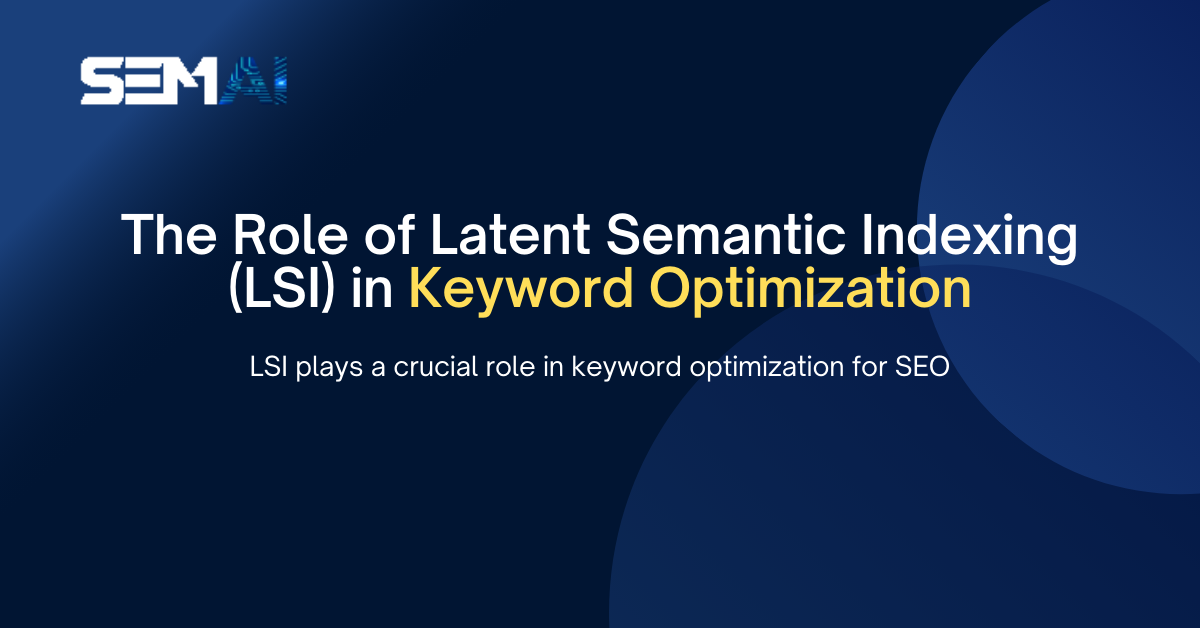Search engine optimization (SEO) is crucial for online visibility. While traditional keyword research focuses on specific terms, a more sophisticated approach, Latent Semantic Indexing (LSI), has emerged to significantly enhance keyword optimization strategies. This guide explores the role of LSI in boosting your search engine rankings and improving your overall SEO.
What is Latent Semantic Indexing (LSI) and How Does it Work?
Latent Semantic Indexing (LSI) is a mathematical technique that analyzes the relationships between words and phrases based on their contextual meaning. Unlike traditional keyword matching, which relies on exact keyword repetitions, LSI understands the semantic connections between words. This allows search engines to comprehend the context and intent behind your content, leading to more accurate ranking and improved user experience.
LSI works by identifying synonyms, related terms, and concepts associated with your target keywords. By incorporating these LSI keywords into your content, you create a richer, more comprehensive piece that resonates better with both search engines and your audience. Think of it as teaching the search engine the nuances of your topic, not just listing keywords.
How Latent Semantic Index Keywords Enhance Keyword Optimization
Integrating LSI keywords into your SEO strategy offers several key advantages:
- Broader Keyword Reach: LSI expands your website’s visibility by associating your content with a wider range of related search terms. Instead of ranking only for your exact target keywords, you’ll also rank for related phrases and synonyms, attracting a larger audience.
- Improved Contextual Relevance: LSI helps search engines understand the context of your content more accurately. This leads to improved categorization and ranking, increasing your chances of appearing in relevant searches.
- Natural Content Creation: LSI discourages keyword stuffing—a practice penalized by search engines. By using LSI keywords, your content flows naturally, enhancing readability and user experience.
- Enhanced User Experience: By addressing user search intent with comprehensive, relevant content, LSI improves the user experience. This leads to lower bounce rates, increased engagement, and stronger signals to search engines.
- More Comprehensive Content: LSI encourages deeper content creation by prompting you to explore related concepts and terms, leading to more informative and valuable content for your audience.
Discovering and Utilizing Latent Semantic Index Keywords
Identifying effective LSI keywords requires a strategic approach. Here’s how to find them:
- Analyze your target keyword: Begin by thoroughly researching your primary keyword. Understand its various nuances and related concepts.
- Use keyword research tools: Employ tools like Google Keyword Planner, Ahrefs, SEMrush, etc., to uncover related keywords and search queries.
- Examine competitor content: Analyze what keywords your competitors are using. This can provide insights into successful LSI keyword strategies.
- Look at “People also ask” and “Related searches”: These features within Google search results often reveal valuable LSI keywords.
- Leverage your content’s semantic context: Naturally incorporate related terms that enhance your content’s overall meaning and context.
Overcoming Keyword Stuffing with LSI Keyword Strategies
Keyword stuffing is a detrimental SEO practice. Search engines penalize websites that excessively repeat keywords unnaturally. LSI provides a powerful alternative. By utilizing synonyms, related phrases, and variations of your target keywords, you create content that is both informative and optimized for search engines without resorting to manipulative techniques. This approach results in a better user experience and improved search engine rankings.
What are the Benefits of Using LSI Keywords for SEO?
The advantages of incorporating LSI keywords in your SEO strategy are significant and far-reaching. They lead to improved search engine rankings, increased organic traffic, enhanced user experience, and a more robust online presence. By understanding the contextual relationships between words, and leveraging LSI effectively, you can create content that is both engaging and optimized for search engines, leading to substantial improvements in your overall SEO performance.
The Role of Latent Semantic Indexing (LSI) in Modern SEO
In today’s sophisticated search engine landscape, LSI is no longer a niche technique; it’s a fundamental aspect of effective SEO. Search engines are becoming increasingly adept at understanding context and intent. By embracing LSI, you align your content with this evolution, ensuring your website remains competitive and visible in search engine results.
Conclusion: Mastering LSI for Long-Term SEO Success
Mastering latent semantic indexing (LSI) is key to unlocking the full potential of your keyword optimization strategy. By understanding the contextual relationships between words and phrases, and skillfully incorporating LSI keywords into your content, you can significantly improve your search engine rankings, attract a larger audience, and build a strong online presence. Remember to focus on creating high-quality, informative content that naturally incorporates LSI terms—this is the recipe for sustainable SEO success.

Leave a Reply